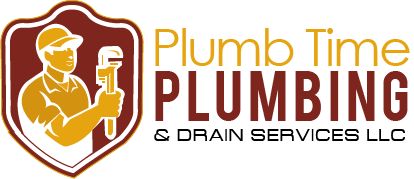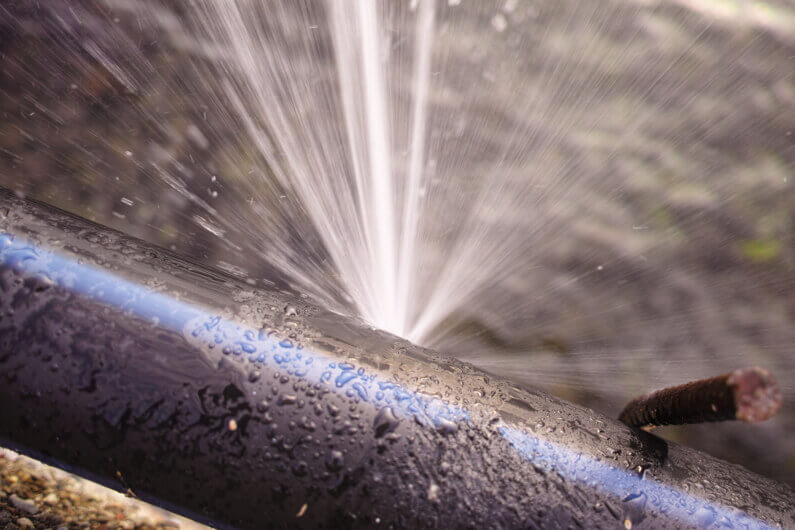Savvy homeowners who take a DIY approach to home maintenance can often handle minor plumbing issues. It’s not difficult to change a leaky faucet, replace the fill valve on the toilet, or unclog the kitchen sink.
With a little know-how and the right tools, most homeowners can manage minor leaks, especially if they’re coming from plumbing fixtures. Another kind of plumbing issue isn’t so simple to fix. This problem can lurk undetected for weeks, sometimes months.
In today’s post, we’re sharing critical information about slab leaks—those hidden leaks that occur in your hot or cold water pipes buried under your home’s foundation.
If you’ve never experienced a slab leak, count yourself lucky. Even so, you’ll want to learn more about this plumbing dilemma so that you’re prepared to act before a slab leak causes damage.
What Is a Slab Leak?
If you live in a home with a basement or crawlspace, you won’t need to worry about a slab leak. Homes built on slab foundations, however, have under-slab plumbing. In this type of system, cement surrounds the plumbing pipes.
As you can imagine, anything buried in cement is difficult (but not impossible) to troubleshoot, access, and repair. Before jumping to the conclusion that someone made a mistake when running the water pipes underneath your foundation, it’s the most cost-effective way of getting water into your home.
If you had x-ray vision, you could see the copper water lines connected at manifolds, each routed to the fixtures in your home. These water lines deliver hot and cold water to your faucets, showers, washing machines, and toilets.
Sometimes one of the water lines develops a pinhole leak. Voila—you have a slab leak!
How common are slab leaks, and what causes them? We’ll answer those questions in the next section.
How Slab Leaks Develop Under a Foundation
Homeowners living in areas prone to earthquakes are at a higher risk than most people. Earthquakes, even those tiny tremblors that don’t get attention on the national news, can put pressure on plumbing pipes, causing them to crack.
While we likely won’t experience any earthquakes in South Carolina, pressure can still impact the concrete slab. Stress often causes soil to shift, which can make the slab foundation move slightly. If you don’t live in an earthquake hot spot, poor construction or soil erosion can result in heaving and shifting soil.
Abrasion also causes slab leaks.
Using your x-ray vision again, imagine the water as it moves through the plumbing pipes. The movement causes vibrations, and when the pipe comes in contact with a hard surface, as it does when buried under the foundation, those natural vibrations can cause excess wear on the line. Over time, the pipe develops a pinhole leak.
Also, even though copper makes a durable material for water supply lines, it’s not infallible. Age and corrosion impact the best of us!
Signs You Have a Slab Leak
We’ve already mentioned how slab leaks work covertly, right under your feet (and your nose). How do you know then if you have a leak?
Use your senses!
If you find the water coming up under your floor, pay attention to the temperature. If you don’t have radiant heat and feel hot water, suspect a hot water slab leak.
Your nose is another detection tool. If you notice a moldy odor in your home, you have excessive moisture. If you can’t locate the source of the smell, call your plumber—they’re experts at narrowing down the cause of mold development, including slab leaks.
Keep your ear tuned! If you hear the sound of running water, especially when there’s no one using water, there’s a leak somewhere. When the sound comes from under the floor, it’s audible evidence of a slab leak.
Finally, your water bill can provide clues. Rising water bills with no reasonable explanation can indicate a leak.
Whether you have a slab leak or not, each of these scenarios means you have a plumbing problem. Don’t wait to contact a plumber. Ignoring the issue may result in water damage.
A Plumber Is the Best Slab Leak Detective
All of your evidence may point to a slab leak, but you can’t rely solely on your senses. Slab leak detection requires a professional plumber to come in and assess the situation.
Plumbers use their senses as well, but they also have access to the latest plumbing technology. For example, plumbers use a ground mic, which can pick up sounds made by leaks that occur when water moves through a pipe. A video camera can reveal pinhole leaks.
How Plumbers Approach Slab Leak Repair
Plumbing professionals consider several options when dealing with slab leaks. The one they choose depends on the pipe condition and the severity of the leak.
When they have a short piece of the damaged pipe, your plumber will typically repair or replace only the affected section. It’s the most practical and least invasive remedy.
Old pipe or one in poor condition may be beyond repair. A repair could result in a leak somewhere else on the existing pipe. In that case, your plumber may choose to re-route the pipe.
If you live in an old house, your entire pipe system may show signs of significant deterioration. Plumbers often suggest re-piping to avoid future leaks and costly repairs. The painful thing about re-piping is that it’s quite invasive and requires cutting into both the floor and the slab.
Another less-invasive solution is trenchless pipe repair. Pipe re-lining allows the plumber to make access holes at each end of the leaking pipe. The plumber then presses a new liner through the existing pipe, covering the break and sealing leaks.
Need to Schedule Slab Leak Detection and Repair?
When the signs all point to a leak under your foundation, what’s your next step? Unlike many other plumbing issues, slab leaks need more than a wrench and a quick fix.
If you suspect a slab leak, it’s time to call a plumber for assistance. Your plumber will work with you to determine the solution that makes the most sense.
For help detecting a slab leak, or if you need to schedule other plumbing services, contact the team at Plumb Time Plumbing and Drain Services. With over 28 years of plumbing experience, we’ve never met a leak we can’t find and resolve.










